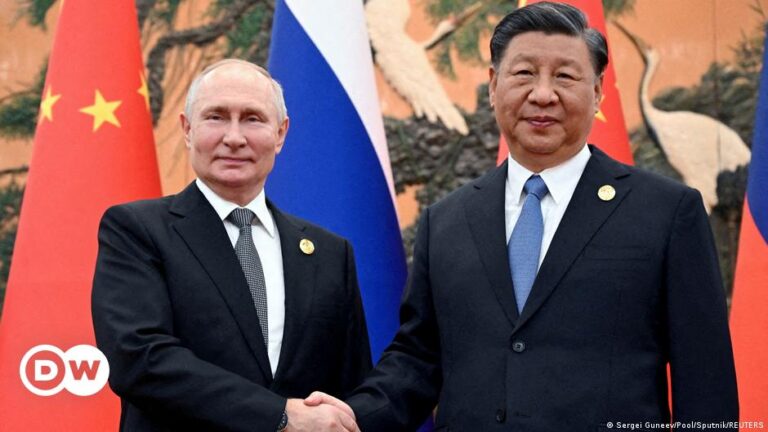NATO leaders are due to meet in the US capital not only to approve new military aid to Ukraine but also to take a tougher stance against China.
In an interview with U.S. media ahead of the summit, NATO Secretary-General Jens Stoltenberg described China as “the main supporter of Russia’s war of aggression in Ukraine.”
US Secretary of State Antony Blinken told DW at a foreign ministers’ meeting in Prague in May that China’s support is “making a huge difference on the battlefield right now,” adding that it was “not convincing” that China was claiming to seek better ties with European countries while at the same time stoking the biggest threat to European security.
China has repeatedly denied supplying weapons to Russia, but allies accuse it of bolstering Russia’s military by providing key components.
According to U.S. assessments, China is the largest supplier of machine tools, microelectronics, nitrocellulose (essential for making munitions and rocket propellers) and other dual-use items Moscow uses to bolster its defense industrial base.
NATO countries see China’s actions during the Ukraine war as evidence that Europe cannot ignore the challenge posed by Beijing.
According to a senior State Department official, the alliance is now “laser-focused on the relationship between China and Russia.”
Is China a problem for the entire US alliance system?
This marks a major shift for an organization that has traditionally focused on transatlantic security. China did not feature in NATO’s senior public documents until late 2019. Only in its latest strategic vision, agreed in Madrid for 2022, did NATO portray Beijing’s ambitions as a challenge to NATO security.
“A shift is happening,” Liselotte Odgaard, a senior fellow at the conservative Hudson Institute in Washington DC, told DW, which began under former US President Donald Trump and “is picking up steam in Europe.”
Odgaard said the United States has long viewed China as the biggest threat to its security interests, “but the United States has tried to convince Europe and to get the Europeans to understand that China is also a problem for Europe and for the entire U.S. alliance system,” he said.
Many in Europe now seem to acknowledge that U.S. allies in Asia and Europe face similar challenges. “As Russia and China cooperate, Europe needs to emulate that cooperation by strengthening cooperation with its Asian partners,” Odgaard said.
What are Indo-Pacific countries saying?
Faced with a more assertive and aggressive China, some Asian countries also seem convinced of the need for greater cooperation.
The Japanese prime minister spoke about Russia’s invasion of Ukraine when he addressed the US Congress in April this year. “Today’s Ukraine may be tomorrow’s East Asia,” Prime Minister Fumio Kishida told US lawmakers.
In June, South Korea’s national security adviser Chang Ho-jin told reporters that South Korea would consider the possibility of supplying weapons to Ukraine after the leaders of North Korea and Russia signed a pact pledging to defend each other in the event of war.
New joint projects with Indo-Pacific countries
NATO has been working with partners in the Indo-Pacific region since the early 2000s, but Russia’s war in Ukraine and the security challenges posed by China have led to deeper engagement.
The alliance sees these countries, which are in the same region as China and bring new insights to the table, as partners in countering attempts by China and Russia to challenge the rules-based global order.
The leaders of Japan, South Korea, Australia and New Zealand have been invited to join the meeting in Washington DC, which will mark their third summit.
Ahead of the talks, NATO Secretary-General Jens Stoltenberg said the allies and Indo-Pacific nations would “build practical cooperation on major projects in Ukraine, cyber and new technologies,” and also wanted to cooperate more closely on defense production.
No liaison office in Japan
But NATO allies are also divided over how to approach the Indo-Pacific. Last year, France blocked a NATO plan to open a liaison office in Japan, arguing that the alliance is geographically limited to the North Atlantic.
Germany generally acknowledges the importance of the region, but Berlin still sees China as a key partner in dealing with global challenges, despite its increasingly assertive policies.
Meanwhile, Hungary is cooperating closely with China in areas such as electric vehicles.
Will NATO make things worse?
And some observers point out that NATO’s involvement in the Indo-Pacific has not been welcomed by everyone. “The region is very volatile, but there is no active war going on right now,” Shada Islam, an independent EU adviser in Brussels, told DW.
“Most of the countries I’ve spoken to – Indonesia, Malaysia, even India – they don’t want this foreign power to come into the region and escalate things,” Islam said.
So building closer ties with Indo-Pacific partners while taking a tougher stance on China will remain a difficult balancing act for NATO.
“It’s a balancing act because there is a risk of escalation,” Liselotte Odgaard of the Hudson Institute told DW.
He said that if NATO countries applied too much pressure, China might decide to further strengthen cooperation with Russia, North Korea and Iran, which would clearly not be in NATO’s interest.
Editor: Andreas Illmer

